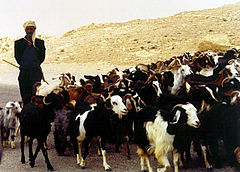This is an old revision of this page, as edited by SwisterTwister (talk | contribs) at 06:36, 8 October 2015 (Reverted edits by 2001:56A:7245:1300:E005:1932:38FC:54C4 (talk) to last version by 24.237.5.198). The present address (URL) is a permanent link to this revision, which may differ significantly from the current revision.
Revision as of 06:36, 8 October 2015 by SwisterTwister (talk | contribs) (Reverted edits by 2001:56A:7245:1300:E005:1932:38FC:54C4 (talk) to last version by 24.237.5.198)(diff) ← Previous revision | Latest revision (diff) | Newer revision → (diff)
A goatherd or goatherder is a person who herds goats as a vocational activity. It is similar to a shepherd who herds sheep. Goatherds are most commonly found in regions where goat populations are significant; for instance, in Africa and South Asia. Goats are typically bred as dairy or meat animals, with some breeds being shorn for wool (see Goats in agriculture).
Companies using goats to control and eradicate leafy spurge, knapweed, and other toxic weeds have sprouted across the American West.
Goatherds in fiction
Fictional goatherds include Peter from Johanna Spyri's Heidi, and the song "The Lonely Goatherd" from The Sound of Music. Enid Blyton's novel The Secret of Killimooin, set in the fictional but probably eastern European country of Baronia, features a blind goatherd called Beowald, so in tune with his environment that he can roam the mountains using his other senses, apparently unhindered by his lack of sight. The Link who appeared in The Legend of Zelda: Twilight Princess was also a goatherd.
References
- "American Pastoral". Brown Alumni Monthly. Sep–Oct 2012.
{{cite news}}: Italic or bold markup not allowed in:|publisher=(help)